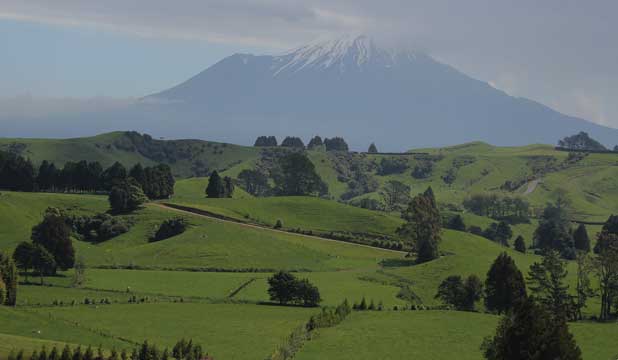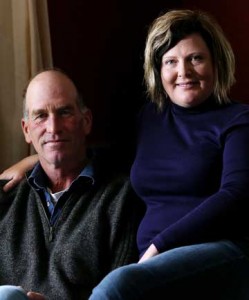
SHOWCASE: Mt Taranaki provides a backdrop to Mangaotea Farm owned by Robin and Jacqueline Blackwell, who enjoyed success in the 2014 Taranaki Farm Environment Awards.
The taste of success in the 2014 Taranaki Ballance Farm Environment Awards has whetted the appetite of Tariki farmers Robin and Jacqueline Blackwell.

PASSIONATE ABOUT FARMING: Robin and Jacqueline Blackwell won four merit prizes in the 2014 Taranaki Farm Environment Awards.
The couple, who own Mangaotea Farm, a multi-faceted operation that includes breeding and selling bulls, dairy grazing and a sheep stud, won four merit prizes in the competition, held in Taranaki this year for the first time.
Now held in 10 regions, the Farm Environment Awards are organised by the New Zealand Farm Environment Trust which formed a partnership last year with the Taranaki Regional Council to bring the contest to Taranaki.
Tikorangi’s Trewithen Farm, owned by Faull Farms and operated by sharemilkers Loie and Tony Penwarden, were the supreme winners.
Contest judges highlighted the Blackwells’ commitment to and passion for Mangaotea Farm, which winters 11,327 stock units on a 90:10 cattle to sheep ratio.
At Mangaotea Farm the Blackwells breed angus, hereford and murray grey bulls and buy jerseys as weaners for their annual on-farm sale. The sale has grown from 60 bulls at their first one 17 years ago to 180 yearlings and two-year-olds at this year’s 18th event on September 18.
As well as breeding bulls, they also graze young dairy stock for long-term clients and operate a southdown stud. Demand for their southdowns rams is so great they can’t breed enough.
After the bull sale, bulls can remain on the property until November 20 when paddocks are shut up so 1500 bales of hay can be made in late summer for winter use on the farm and for sale. They also make 350 bales of silage.
Last year’s drought and this year’s dry spell have been challenging. Last spring they made extra supplement to fill any feed deficit. “I like to have it there in case, to have feed in the bank. We’ll keep doing that,” Robin Blackwell said.
The two dry years have also prompted the couple to investigate ways of harnessing water on the property, where annual rainfall is 1800mm.
The 658ha Mangaotea Farm consists of flat to easy rolling country with some steep ridges and gullies. Its high point is 307m above sea level.
Robin grew up in the Tariki area and in 1980 he took over the original 80ha block of Mangaotea that his father, Maurice, had bought in 1963. The couple have gradually increased the size of their holding, purchasing five neighbouring blocks between 1991 and 2009 and leasing a 215ha adjacent property. Their total effective area is 591ha.
They’ve established infrastructure like fenced drains, laneway and shelter with an eye for ease of management. Four kilometres of fenced laneways across the farm allow stock to be moved easily.
The farm takes its name from the Mangaotea Stream which runs through the property. Fencing and planting the stream began in the 1990s and so far they’ve fenced 14.4km of streambank and planted 3300 plants.
They’re also fencing and planting minor tributaries to keep stock out of waterways. “It saves time and money. We don’t lose stock and we don’t have to clean the drains,” said Jacqueline Blackwell. “Fencing the drains means less work in the long run. We don’t have to spend time clearing them because they don’t get blocked and we never lose stock.”
Robin said riparian fencing and planting was part of any development both because it protected the environment and made wintering of cattle much easier. “Any development is viewed long-term. We do it once and we do it properly.”
They’ve also placed two 1.5ha peat swamp areas with mature kahikatea in a Queen Elizabeth II National Trust covenant and they’re planning to establish covenants on other areas of the farm.
Under a Taranaki Regional Council land management plan, they’ve left erosion-prone land in native vegetation or retired it.
They were persuaded by TRC land management officer Jessica Hyland to enter the Ballance awards.
“We hadn’t thought about it but we thought we’d like to give it a go. We like to push boundaries because it’s good to benchmark against others,” Robin said. “But there’s no such thing as the perfect farm.”
The contest provided an opportunity to step back from their business and look at it objectively. “You get so busy in the day-to-day activities that you don’t always sit back and look at the big picture.”
Despite their success, Jacqueline said their involvement with the contest didn’t feel complete.
“We’re always open to opportunities to showcase what we do and we work well as a team, bouncing ideas off each other. We love to showcase our product and compare it against the rest of the country. We genuinely love what we do.”
The couple want to be in the top 10 per cent of farms for performance. She said with repeat clients in all facets of their business, they believed their customers were satisfied. “We think ahead and think about the consumer and the way they would view our property.”
Robin described the level of competition as impressive. He enjoyed the positive atmosphere of the awards evening and found the stories of other contestants stimulating.
Feedback from the judges highlighted the strengths and weaknesses of their operation. “The weaknesses they mentioned were those areas in the back of our minds where we thought we should be doing more. So we’re acting on suggestions to build strengths in those areas.”
One weakness was the lack of written health and safety documentation which, with just one staff member, they had not developed.
Judges said the way the couple managed their multi-faceted operation was a strength, as was their infrastructure, biodiversity, animal health and sustainability. The judges were impressed with their measures to protect stock health and their awareness of the risk posed by movement of multiple stock classes in and of the property.
In time their adult children want to be part of the business. “Our job is to build the brand and set it up for them to diversify and carry it on,” Jacqueline said.
Daughter Zarrah works on a sheep station in Australia, son Hamish is an earthmoving contractor in Marlborough and Daniel is a software engineer in London.
In the past the couple have succeeded in Beef + Lamb NZ’s Steak of Origin awards, three times as semi-finalists and once as a finalist.
This year is the fourth they have entered the contest. Two angus animals and a murray grey were processed at Taranaki Abattoirs at Stratford in March. Semifinalists will be announced on Monday.
Jacqueline said the couple was thrilled with their success at the awards. They won Beef+ Lamb New Zealand’s livestock award, Hill Laboratories harvest award, Donaghys farm stewardship award, and the Taranaki Regional Council sustainability award.
Their team of supporters, including sole employee Mike Johnson, Merial Ancare territory manager Tony Hammond, PGG Wrightson’s Kim Harrison, CMK’s Brian McFarlane, of Stratford, Taranaki Veterinary Centre vet Craig Hassell, BNZ’s Leean Nelson and Alison Sulzberger and Silver Fern Farms’ Phil Morresey, joined them at the awards evening in New Plymouth earlier this month.


